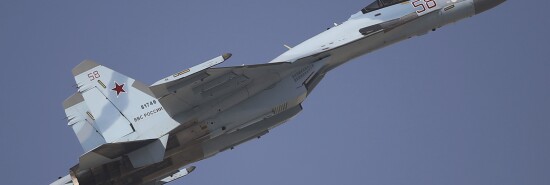
In bad sign for Russian arms export industry, major air showed canceled
Tom Rogan
Video Embed
In an ominous sign for its arms export industry, Russia canceled a major air show for the first time in 30 years. The Kremlin says the cancellation is a response to escalating security threats. And while this concern is legitimate to some extent, there’s more going on here than fear of Ukrainian saboteurs.
Hosted at one of Moscow’s international airports, the MAKS air show is held every two years. It aims to advertise jet aircraft and various other weapons systems to prospective foreign buyers. Russia’s arms trade has been a historically lucrative part of an export industry otherwise dominated by energy supplies.
MAKE OR BREAK: THIS WEEK INTO NEXT IS CRITICAL WINDOW FOR DEBT CEILING NEGOTIATIONS
Today, however, Russian arms exports are falling. This is both a result of increasingly diversified purchases by longtime clients such as India, and of growing strains on the Russian defense industry. Western sanctions imposed since the start of Russia’s war in Ukraine have complicated supply chains for complex manufacturing projects. At the same time, the needs of the Russian armed forces are putting their own pressure on arms manufacturers to replace destroyed equipment. A representative of one major Russian defense manufacturer told Kommersant that they met the air show cancellation “with a measure of relief, as there are too many production tasks.”
Still, there’s no question that this cancellation is a big loss for the Kremlin. Russia’s arms export industry has long been a point of key pride for Vladimir Putin. The Russian leader sees this industry as a marker of his personal prestige and of Russia’s continued relevance as a global military power. He has personally attended previous MAKS shows. Russia’s major aviation firms also see the show as important for broadcasting both existing platforms and their in-development projects. A display version of Sukhoi’s Su-75 fighter jet was unveiled at the 2021 show, for example.
Unfortunately for the Kremlin, this cancellation is only the tip of the iceberg for Russia’s arms industry challenges. The war in Ukraine has shown the actual performance of many once-vaunted Russian systems to be less than inspiring. Even Russia’s hypersonic Kinzhal missile appears vulnerable. At least one was recently shot down by a far older Patriot anti-air system in Ukraine’s possession.
Yes, the arms trade is imbued with political calculations, with purchases often designed as much to earn favor with a foreign government as to provide for new military capabilities. This is why, for example, the French are notorious for using their intelligence services to spy on competitor arms sellers and to bribe prospective buyers. Nevertheless, few governments want to spend billions of dollars on arms systems that later turn out to be defective. Ukraine has introduced a new de facto contract term for all future Russian arms buys: caveat emptor.
It’s not all bad news for the Russian-aligned world. Russia’s key partner China is rising in its relevance in the global arms trade. The South China Morning Post reports that China is negotiating major arms deals with Egypt and Saudi Arabia. Again reflecting the political dimensions of the arms trade, this increasing Middle Eastern interest in China reflects a broader loss of U.S. arms export interest in the region. Allies are looking elsewhere in protest at the absurd U.S. obsession with Jamal Khashoggi.
But the top line of this announcement is clear: Russia’s arms trade is in big trouble.
